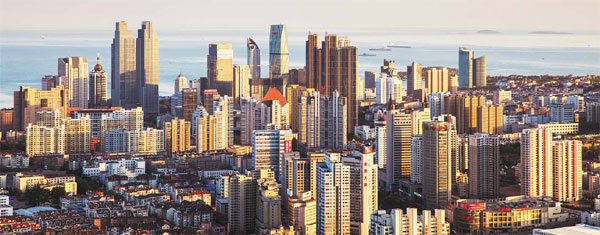Qingdao aims to become 'city of innovation'
Local government provides ample support for startups
Qingdao in East China is striving to become a city of innovation, a capital of startups and a peninsula of independent thinkers, said a local official.
"Qingdao has distinctive features and an amazing charm," said Party chief Li Qun in a recent interview. "It has already earned a reputation as a superior city of ports, tourism, brands, movies, music and sailing.
"Now innovation, mass entrepreneurship and the 'maker culture' will bring new vitality and add another shining signature to the city." The maker movement refers to a tech-influenced do-it-yourself community.
With abundant support from the city government, startups are mushrooming in Qingdao.
Last year, the number of new enterprises in Qingdao registered a 56.6 percent year-on-year increase, and 300,000 private businesses were founded, a 229 percent rise from a year earlier.
To ensure startups get sufficient funding, the city has set up a 1 billion yuan ($160 million) foundation to provide small loans for startups and a 1 billion yuan fund to reward entrepreneurship and encourage the creation of more jobs.
"The development of the 'Internet Plus', open-source software and hardware, and 3D printing, is fueling innovation among a growing number of people who are turning their ideas and hobbies into reality," Li said. "Technology incubators offer a great platform to help them transform these inventions into sustainable businesses."
Xu Qiang, founder of Heivr, started the business from his hobby of virtual technology. He came close to bankruptcy not long after he founded the company in 2008, as he couldn't afford rent and other operational costs.
Things turned around after he moved into the College Students' Innovation Incubation Center of Qingdao in 2010. The center offered him discounted rent for three years and free access to its research and development facilities such as DaVinci Resolve and Dell Renderfarm.
Heivr now boasts annual revenue of 10 million yuan and has become a regional leader in interactive and augmented reality marketing solutions.
Wang Minyan, an enterprise tutor at Top Innovation Works in Licang district, said the company reviews 500 startup proposals every year and so far has incubated 52 qualified enterprises.
Other highlight incubators in Qingdao include Haier Maker Space, Jiaozi Maker Space, Industrial Design Space and PHD Startups Park.
'Core competency'
"Qingdao is making every effort to boost innovation and mass entrepreneurship, which is the core competency of a city's development," Party chief Li said.
The city has implemented Project 311, covering one valley and two areas - the Blue Silicon Valley, West Coast New Area and Hongdao Economic Area. The three areas are planned to become a hub for innovation, entrepreneurship and creativity, local officials said.
Sources with the Qingdao Science and Technology Bureau said that overall R&D expenditure is expected to account for 2.77 percent of Qingdao's gross domestic product by 2016, with an average of 15 valid patents owned by every 10,000 people.
The city aims to develop 1,000 high-tech firms and more than 8,000 medium and micro technology companies which are anticipated to contribute to a combined technology transaction amount of 10 billion yuan within two years.
Qingdao is home to 66 scientific research institutions, 155 key laboratories, 10 national engineering research centers and 14 national incubators, as well as many major enterprises with strong innovation capabilities, such as electronics manufacturers Hisense and Haier.
Qingdao accommodates 30 percent of China's oceanographic research institutions, and half of the country's top marine scientists now work in the city.
At present, 63,000 technology developers work in Qingdao, including 1,630 certified as outstanding national talents and 28 academics from the Chinese Academies of Sciences and Engineering.
"Scientific innovation has changed life for everyone and plays an instructive role in welfare projects for our people, including education, employee compensation, health care, retirement, housing and charity," Li said.
For example, the city has been building its Digital Campus Project since 2012 by enabling Internet access to share superior education resources and enhance communication among teachers and students in different schools, he said.
By 2016, 85 percent of Qingdao's middle and elementary schools are expected to become smart digital schools.
Qingdao's Traffic Department also implemented a Paralleled Smart Transportation System developed by the Qingdao Smart Technology Research Academy, which has improved traffic capacity by 20 percent to 30 percent on several roads without any expansions or major changes.
Contact the writers at xiechuanjiao@chinadaily.com.cn and huqing@chinadaily.com.cn
|
The coastal city of Qingdao, in East China's Shandong province, plans to encourage innovation and mass entrepreneurship in a bid to increase its core competency. Shi Zaohua / for China Daily |



















